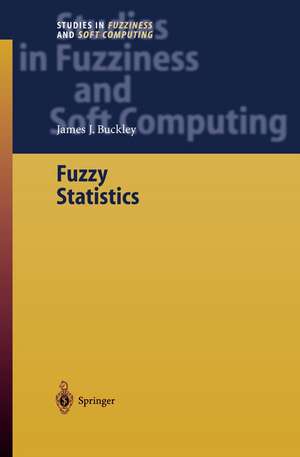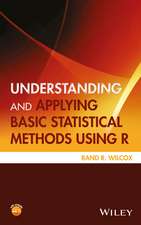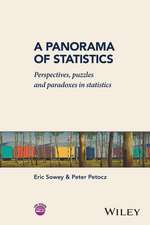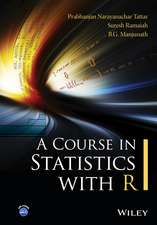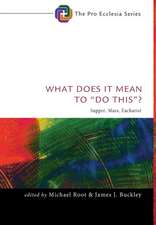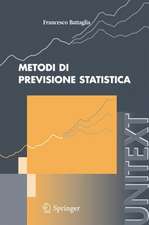Fuzzy Statistics: Studies in Fuzziness and Soft Computing, cartea 149
Autor James J. Buckleyen Limba Engleză Hardback – 5 apr 2004
| Toate formatele și edițiile | Preț | Express |
|---|---|---|
| Paperback (1) | 629.10 lei 6-8 săpt. | |
| Springer Berlin, Heidelberg – 15 dec 2010 | 629.10 lei 6-8 săpt. | |
| Hardback (1) | 638.76 lei 6-8 săpt. | |
| Springer Berlin, Heidelberg – 5 apr 2004 | 638.76 lei 6-8 săpt. |
Din seria Studies in Fuzziness and Soft Computing
- 20%
 Preț: 999.85 lei
Preț: 999.85 lei - 20%
 Preț: 653.06 lei
Preț: 653.06 lei - 20%
 Preț: 872.96 lei
Preț: 872.96 lei - 20%
 Preț: 930.57 lei
Preț: 930.57 lei - 20%
 Preț: 1051.00 lei
Preț: 1051.00 lei - 20%
 Preț: 992.44 lei
Preț: 992.44 lei - 20%
 Preț: 655.85 lei
Preț: 655.85 lei - 20%
 Preț: 1001.86 lei
Preț: 1001.86 lei - 18%
 Preț: 954.14 lei
Preț: 954.14 lei - 20%
 Preț: 330.10 lei
Preț: 330.10 lei - 20%
 Preț: 333.04 lei
Preț: 333.04 lei - 20%
 Preț: 997.56 lei
Preț: 997.56 lei -
 Preț: 391.61 lei
Preț: 391.61 lei - 20%
 Preț: 647.79 lei
Preț: 647.79 lei - 20%
 Preț: 986.01 lei
Preț: 986.01 lei - 18%
 Preț: 958.56 lei
Preț: 958.56 lei - 20%
 Preț: 996.40 lei
Preț: 996.40 lei - 20%
 Preț: 999.35 lei
Preț: 999.35 lei - 15%
 Preț: 646.43 lei
Preț: 646.43 lei - 20%
 Preț: 651.57 lei
Preț: 651.57 lei - 20%
 Preț: 997.89 lei
Preț: 997.89 lei - 15%
 Preț: 641.03 lei
Preț: 641.03 lei - 20%
 Preț: 1009.74 lei
Preț: 1009.74 lei - 20%
 Preț: 992.62 lei
Preț: 992.62 lei -
 Preț: 388.72 lei
Preț: 388.72 lei - 18%
 Preț: 1223.43 lei
Preț: 1223.43 lei - 20%
 Preț: 651.42 lei
Preț: 651.42 lei - 18%
 Preț: 951.59 lei
Preț: 951.59 lei - 18%
 Preț: 948.61 lei
Preț: 948.61 lei
Preț: 638.76 lei
Preț vechi: 751.47 lei
-15% Nou
Puncte Express: 958
Preț estimativ în valută:
122.24€ • 126.28$ • 101.74£
122.24€ • 126.28$ • 101.74£
Carte tipărită la comandă
Livrare economică 25 martie-08 aprilie
Preluare comenzi: 021 569.72.76
Specificații
ISBN-13: 9783540210849
ISBN-10: 3540210849
Pagini: 180
Ilustrații: XI, 168 p.
Dimensiuni: 155 x 235 x 15 mm
Greutate: 0.37 kg
Ediția:2004
Editura: Springer Berlin, Heidelberg
Colecția Springer
Seria Studies in Fuzziness and Soft Computing
Locul publicării:Berlin, Heidelberg, Germany
ISBN-10: 3540210849
Pagini: 180
Ilustrații: XI, 168 p.
Dimensiuni: 155 x 235 x 15 mm
Greutate: 0.37 kg
Ediția:2004
Editura: Springer Berlin, Heidelberg
Colecția Springer
Seria Studies in Fuzziness and Soft Computing
Locul publicării:Berlin, Heidelberg, Germany
Public țintă
ResearchCuprins
Fuzzy Sets.- Estimate ?, Variance Known.- Estimate ?, Variance Unknown.- Estimate p, Binomial Population.- Estimate ?2 from a Normal Population.- Estimate µ 1 — µ 2, Variances Known.- Estimate ? 1 — ? 2, Variances Unknown.- Estimate d =? 1 — ? 2, Matched Pairs.- Estimate p 1 — p 2, Binomial Populations.- Estimate ? 1 2 /? 2 2 , Normal Populations.- Tests on µ, Variance Known.- Tests on µ, Variance Unknown.- Tests on p for a Binomial Population.- Tests on ? 2, Normal Population.- Tests ? 1 verses ? 2, Variances Known.- Test ? 1 verses ? 2, Variances Unknown.- Test p 1 = p 2, Binomial Populations.- Test d = µ 1 — µ 2 , Matched Pairs.- Test ? 1 2 verses ? 2 2 , Normal Populations.- Fuzzy Correlation.- Estimation in Simple Linear Regression.- Fuzzy Prediction in Linear Regression.- Hypothesis Testing in Regression.- Estimation in Multiple Regression.- Fuzzy Prediction in Regression.- Hypothesis Testing in Regression.- Summary and Questions.- Maple Commands.
Textul de pe ultima copertă
This monograph introduces elementary fuzzy statistics based on crisp (non-fuzzy) data. In the introductory chapters the book presents a very readable survey of fuzzy sets including fuzzy arithmetic and fuzzy functions. The book develops fuzzy estimation and demonstrates the construction of fuzzy estimators for various important and special cases of variance, mean and distribution functions. It is shown how to use fuzzy estimators in hypothesis testing and regression, which leads to a comprehensive presentation of fuzzy hypothesis testing and fuzzy regression as well as fuzzy prediction.
Caracteristici
Starting from basic statistics leading to fuzzy statistics, appealing to statisticians as well as researchers in fuzziness Includes supplementary material: sn.pub/extras
